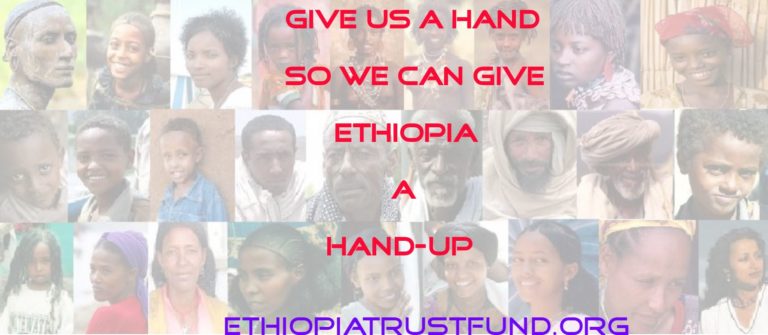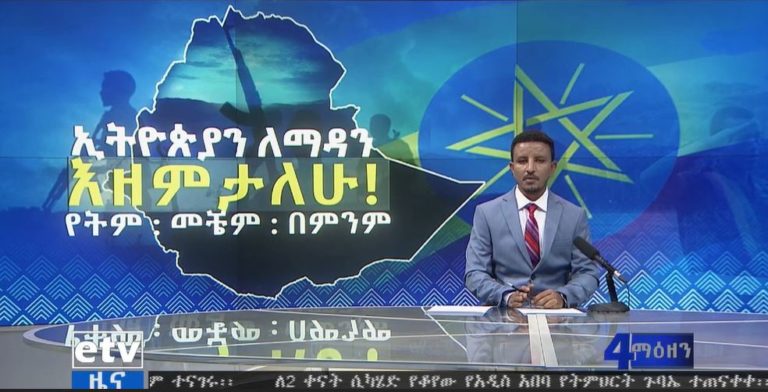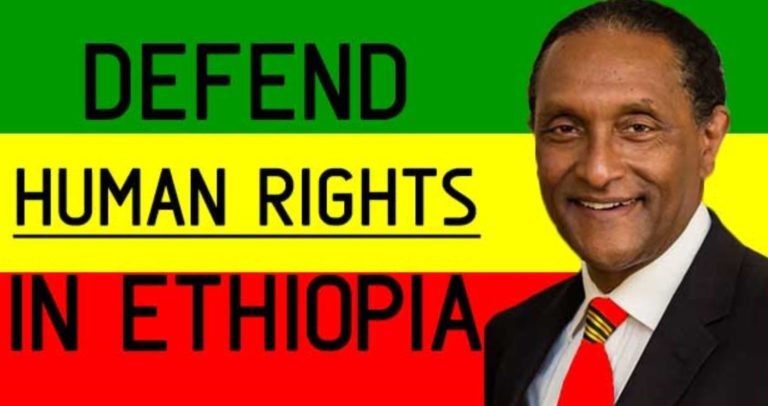Dreams of Brighter Tomorrows in US-Ethiopia Relations
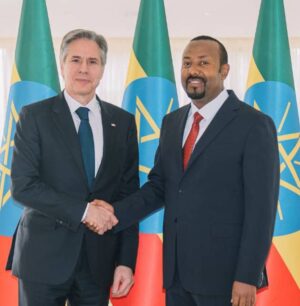
Best to leave bad old days alone because the best is yet to come in Ethiopia-US relations
For the record, over the past two years, there has been no American of Ethiopian ancestry who has been more critical of US policy in Ethiopia than I.
I have written over 100 weekly commentaries with over 300 thousand words slicing, dicing, mincing and shredding the Biden administration’s policy in and public statements on Ethiopia.
I have spared no one in my screeds.
President Joe Biden, Secretary of State Antony Blinken, USAID Administrator Samantha Power, Members of Congress, Senators and others have faced the wrath of my impassioned philippic.
I have engaged in Mano a Mano combat with the New York Times, Bloomberg, CNN, Human Rights Watch and Amnesty International, think tankers, among others, over their blatantly biased reporting and journalistic lynching of Ethiopia and its leaders.
I have even caught Al Jazeera in flagrante delicto (in the act) hating on Ethiopia.
I have used social media to fight malicious disinformation against Ethiopia and in defense of Ethiopia’s honor.
I have even created new words and phrases fighting Ethiopia’s enemies.
Many would describe my commentaries as harsh, acerbic, defiant, unsparing and relentless.
The words speak for themselves.
I was raging against the machine, as it were. The global doomsday machine I believed was rolling to chew and spit out a small country with a long history and great civilization.
But as I think back over the last two years, I can best describe as “times that tried men’s souls,” to borrow from Thomas Paine, the great English-born American Founding Father and author of “Common Sense.”
But there was nothing commonsensical in US-Ethiopia relations over the past two years.
It was a two-year nightmare filled with death and destruction, accusations, recriminations, threats and defiance against threats.
It was a time that tried my soul as an American of Ethiopian ancestry and question my loyalties.
Paine wrote in the “American Crisis”:
“These are the times that try men’s souls; the summer soldier and the sunshine patriot will, in this crisis, shrink from the service of his country; but he that stands it now, deserves the love and thanks of man and woman.
In the Ethiopia-America Crisis of the past two years, my loyalty to the land of my birth and the land that has given me so much was tested in the extreme.
But truth be told, I was never a summer soldier for Ethiopia nor a sunshine patriot for America.
It was never a question of divided loyalties.
My loyalty has always been to truth, fairness, justice, and my inborn flaw of always standing up for the underdog.
Few can question my American patriotism as I have defended, affirming the vow I undertook and without mental reservation or purpose of evasion, the US Constitution in the courts of the land. I have taught it to thousands of young Americans and preached it to the world. Indeed, for three decades I have done so in the courtroom, stateroom, classroom, boardroom and pressroom.
Like William Gladstone, British Prime Minister in the second half of the 19th century, I also believe the U.S. Constitution is
the most wonderful work ever struck off at a given time by the brain and purpose of man. It has had a century of trial, under the pressure of exigencies caused by an expansion unexampled in points of rapidity and range; and its exemption from formal change, though not entire, has certainly proved the sagacity of its constructors, and the stubborn strength of the fabric.
Indeed, a wonderful work but thoroughly imperfect and forever preordained to seek perfection through the good will and good faith of American citizens.
I defended Ethiopia not only because it was my place of birth and where I grew up in my teen years but also because it is the land where my forefathers and foremothers fought and died defending Ethiopia from colonial aggression and bondage.
The humiliation Ethiopia, the only black member, suffered at the League of Nations in 1936 is seared in my mind.
H.I.M. Haile Selassie, the first national leader to ever speak before the League of Nations, pled his case before the mighty European powers heckled and jeered by the European press:
It is collective security: it is the very existence of the League of Nations. It is the confidence that each State is to place international treaties. It is the value of promises made to small States that their integrity and their independence shall be respected and ensured. It is the principle of the equality of States on the one hand, or otherwise the obligation laid upon small Powers to accept the bonds of vassalship. In a word, it is international morality that is at stake.
For me, it was personal morality that was at stake.
Can I keep quiet when the very existence of Ethiopia is in question?
When her sovereignty, dignity, integrity and independence is trashed?
When Ethiopia is treated unfairly, unjustly by the most powerful?
When her people and leadership are treated like dirt?
When obligation is laid upon her to accept the bonds of vassalship?
In his “Peace on Earth” sermon in 1967, Dr. Martin Luther King, Jr. taught:
Now let me suggest first that if we are to have peace on earth, our loyalties must become ecumenical rather than sectional. Our loyalties must transcend our race, our tribe, our class, and our nation; and this means we must develop a world perspective. No individual can live alone; no nation can live alone. We must either learn to live together as brothers or we are all going to perish together as fools.
My loyalties transcend race, tribe, class, and nation. I have a global perspective for I live in a global village.
I believe the arc of the moral universe bends towards living together as brothers and sisters. We shall not perish because the destiny of fools is to “inherit the winds and serve the wise.”
A new day on the horizon in Ethiopia US relations: Living together as brothers and partners
A new day is dawning in Ethiopia-US relations. I feel it in my bones.
I believe US policymakers have concluded incalculable damage has been done to the mutual interests of both countries over the past two years.
I believe Ethiopians believe they have been betrayed, abandoned and double-crossed by the Biden administration.
In the May 10, 2022 “Country Security Report,” the US State Department concluded:
Anti-U.S./Anti-Western Sentiment
Historically there has not been strong anti-U.S. or anti-Western sentiment in Ethiopia. However, increased focus on the Tigray crisis, rising inter-communal violence in the country, and Ethiopia’s stance vis-a-vis its neighbors regarding the Grand Ethiopian Renaissance Dam (GERD) project has been met with a corresponding increase in anti-U.S. sentiment.
During the height of the Tigray crisis, significant anti-U.S. or anti-Western sentiment developed in Ethiopia due to perceived involvement of international and U.S. organizations in the regional conflict between the Ethiopian government and Tigrayan forces.
I do not want to reopen wounds. I would rather heal them.
The fundamental problem is that US policy in Ethiopia has been under the command and control of the “foreign policy blobs.”
Prof. Stephen Walt of the Harvard Kennedy School in his book, “The Hell of Good Intentions, America’s Foreign Policy Elite and the Decline of U.S. Primacy,” argues “both Democrats and Republicans have been misguided in their pursuit of liberal hegemony” by “a very powerful bipartisan consensus within the foreign policy elite.”
The members of this “elite blob” include not only formal institutions of government but also
think tanks, various special interest groups and lobbies that try to advance some foreign policy cause, people in the media who write on a regular basis on foreign affairs and others who write books and articles that shape opinion and train the people who go into key foreign policy positions.
The “foreign policy blobs” pumped the Biden administration the Ethiopian government is a pushover and will topple with minimal pressure.
They advised the Ethiopian people are ethnically/tribally fractured and they will come apart in a New York minute.
But when push came to shove, the Ethiopian people stood as one and defeated their enemy.
The “foreign policy blobs” underestimated the determination and strategic intelligence of the Ethiopian leadership.
In the end, they achieved nothing other than increased polarization between the two countries and drive Ethiopia to seek friends elsewhere.
The fact of the matter is that the Ethiopian leadership is unlike any in Africa.
The Ethiopian leadership has proven its ability to play a critical and vital role in maintaining peace and stability in the Horn region and beyond and in fighting terrorism.
Th Ethiopian leadership has proven its commitment to democracy and human rights under the most challenging conditions.
I have a personal stake in a successful partnership between Ethiopia and the US.
I love both countries and people. We share core values and interests.
Nary a young person in Ethiopia who would not jump at the opportunity to come to America.
Why?
Despite its myriad problems, I believe, as I have said many times before, echoing Lincoln’s words, I believe America is still the “last best hope of earth.”
Despite its myriad problems, I believe, as I have said many times before Ethiopia is the rising sun over Africa. As Ethiopia goes, so does Africa.
Why I believe relations will change for the better and a robust new partnership will soon blossom
I. Acknowledgement of past mistakes
Secretary Blinken said,
For our part, the United States acknowledges human rights violations and repression committed during the past few decades, actions which sowed the seeds of future conflict. We and others were insufficiently vocal about these abuses in the past.”
To me, Secretary Blinken’s acknowledgement of past indifference and silence in the face of flagrant human rights violations was a truth and reconciliation moment. The US indeed turned a blind eye to three decades of TPLF abuse and misrule.
When President Barack Obama visited Ethiopia in July 2015, he shocked the Ethiopian people with the following statement:
I don’t bite my tongue too much when it comes to these issues. We are opposed to any group that is promoting the violent overthrow of a government, including the government of Ethiopia, that has been democratically elected. We are very mindful of Ethiopia’s history – the hardships that this country has gone through. It has been relatively recently in which the constitution that was formed and the elections put forward a democratically elected government.” (Boldface added.)
Then national security advisor Susan Rice busted out laughing as she affirmed that election in which the TPLF won 100 percent of the seats in parliament.
Human Rights Watch rang the bell for a 5-alarm fire following the 100 percent parliamentary victory of the TPLF in 2015.
Sec. Blinken spoke the truth, and “the truth shall set you free.” Free to revamp a new partnership.
No person has a greater desire to see the rule of law and human rights respected in Ethiopia than PM Abiy Ahmed. That is an undeniable fact!
The fact is that Ethiopia has already established a “Transitional Justice” process and the US should defer to it and support it financially and technically so it can be successful and an exemplar for Africa and the rest of the world.
Respect for Ethiopia’s sovereignty in this regard is important.
The US sanctioned the International Criminal Court (ICC) in 2020 for merely raising the possibility of investigating alleged human rights violations by US in various theater of war, including asset freezes and family entry bans against ICC officials.
Ethiopian sovereignty to investigate and prosecute human rights violators should be equally respected. If Ethiopian institutions fail to perform their duties, then alternatives can be sought.
To make real progress, Ethiopian legal institutions must be given full opportunity to address issues of human rights violations over the past two years.
II. Show of respect for the dignity of Ethiopia and its leaders
Over the past two years, what stoked my personal outrage and indignation against the Biden administration was what I perceived to be absolute contempt, disrespect and disregard for Ethiopia and its people.
I wrote my “Clash of Civilization” commentary to educate American foreign policy elites (“the blob”) that Ethiopia may be financially poor but she is Ethiopia Invictus. She has never been never dominated by colonial powers but defeated one of the great European colonial powers twice in less than 65 years, the first time in just a few hours.
Sec. Blinken showed great respect and humility to Ethiopians and their leaders during his visit. He did not use a single threatening word. In every respect, his words were encouraging. I studied his interviews and public statements with forensic scrutiny looking for inconsistencies and subtexts. My conclusion is he was sincere and straightforward. I found no evidence of pretension or deceptiveness in his statements.
Ethiopians hate being humiliated and disrespected, especially by those who seek to dominate them.
They share the spirit of that old African-American freedom song, “Oh-o freedom. Oh freedom over me, (Over me.) And before I be a slave. I’ll be buried in my grave.”
With mutual respect, not only diplomatic doors but also hearts and minds will be opened.
Mutual respect must be the rock-solid foundation of the new Ethiopia-US relations.
III. Acknowledgement of the importance the 120-year-old partnership between Ethiopia and US
Secretary Blinken acknowledged the 120-year-old US-Ethiopia partnership.
The history of the first US mission to Ethiopia is fascinating.
That mission and the signing of 1903 Treaty of Commerce has been wonderfully recounted in Amanda Kay McVety fascinating analysis, “The 1903 Skinner Mission: Images of Ethiopia in the Progressive Era (2011).”
Skinner single handedly worked to make the trade mission possible by pestering the White House. He argued the importance of Ethiopia as a US trading partner in Africa and commitment to long-term investment possibilities. He even argued US trade relations with Ethiopia could preserve Ethiopia’s independence and prevent another colonial attempt.
Skinner creatively proclaimed, “commerce has created itself in [Ethiopia] in spite of American indifference to the desirability of having direct contact with consuming markets and is susceptible of being increased.”
President Teddy Roosevelt even thought about going on a hunting safari in Ethiopia.
The dream of creating diplomatic relations based on trade partnership is yet to be fulfilled.
Indeed, considering the expulsion of Ethiopia from the AGOA regime, it seems the original foundation of a trade partnership remains but a Skinnerian dream.
IV. Acknowledgement of Ethiopia’s leadership role in Africa
Sec. Blinken talked about “the centrality of Ethiopia to the Horn of Africa and the continent as a whole.” A peaceful and stable Ethiopia he said, “will allow Ethiopia to play the role that it should be playing as a leader in Africa and, for that matter, beyond.”
Just in the past five years, Ethiopia has played a central role in peacemaking in the Sudan, south Sudan, relations with Eritrea, Somalia and elsewhere.
It is regrettable that Ethiopia was demonized over the past two years and efforts made to diminish her credibility.
Ethiopia is today the principal practitioner of the “African solution to African problems.”
In partnership with the US, Ethiopia can play a significant role in African peace and security.
V. Acknowledgement of Ethiopian sovereignty
Sec. Blinken underscored US respect for Ethiopian sovereignty. It was refreshing to see that there were no dictats, invocation of sanctions or threats of any kind.
Human rights are to individuals as sovereignty is to nations.
It is not possible to demand respect for the human rights of a people while disrespecting the sovereign rights of their nations.
With mutual respect for each other’s sovereignty, Ethiopia and the US can play transformative roles in African peace and security.
VI. Willingness to restore Ethiopia to the AGOA regime
As I have stated on numerous occasions, I am offended by Ethiopia’s expulsion from AGOA.
But I am encouraged by Sec. Blinken’s statement that there is a “clear pathway back to AGOA” once the peace terms in Ethiopia are implemented.
I understand the mechanics of AGOA certification/decertification. It is a statutory scheme, that is review mandated by law.
It would be a great symbolic act signifying and affirming the new partnership if Ethiopia were restored to AGOA.
It is entirely up to the Biden administration to make that decision. I think it will happen sooner than later.
It is in our hands
It is true, “He’s got the whole world in his hand.”
But Ethiopia-US relations in in our hands.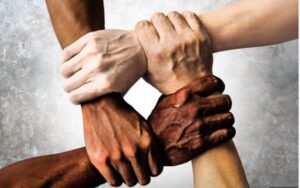
Peace is at hand and in our hands.
Peace and understanding are in the hand that holds the coffee cup.
Peace is in the fingers that sign the agreement.
Peace is in the handshakes, the palm on the shoulder.
We must walk hand in hand as partners and not raise arms to harm each other.
We must work hand in glove.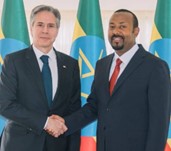
Among partners, there is no upper hand, only handshakes.
We must not have dirty hands but we must never fear to get our hands dirty to make things better.
The big must not handle the small with a heavy hand.
It is better to embrace with both hands than wagging an index finger at each other.
We must always be aware that as we point an index finger outwards, three fingers are pointing at us.
Partnerships grow when the right hand knows what the left hand is doing.
Hands can kill and hands can heal. Let’s strengthen the healing hand.
We must never wash our hands off responsibility in times of controversy.
In the great Ethiopian dining tradition, we must feed each other with hands and never bite the hand that feeds each other.
We lose when we overplay our hands.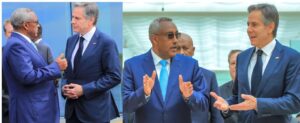
Let’s have a show of hands for a new Ethiopia-US partnership.
On the other hand, we have nothing to lose and everything to gain by rekindling our strong partnership of 120 years.
For that, we need all hands on deck!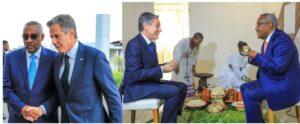
Building momentum for a “revamped partnership”: Changing hearts and minds with public diplomacy
Follow-up is key to success in business, politics or diplomacy.
What is the plan for follow-up in the new Ethiopia-US partnership?
I do not know what plans there are with the Ethiopian government.
But I believe the US has much public diplomacy work to do with the Ethiopian people.
I believe the US Embassy and USAID could educate the Ethiopian public about the nature of the “revamped partnership.”
In my day well over one-half century ago, there used to be an organization called United States Information Service (or Agency?), which did, in contemporary lingo, public diplomacy.
I learned a great deal about America – geography, culture, politics. Law, education…– going to USIS library.
They used to say, the USIS was a “propaganda machine” in the Cold War. I did not care.
As I recall, USIS did undertake projects and activities to inform and even influence the Ethiopian public on its national interests. The USIS provided information about US policies, people, values and institutions with the aim of building strong long-term relationships and inform public attitudes.
As I see it, the great challenge the US will face in Ethiopia is how it can effectively relate to the Medemer Generation (MedGen), that generation symbolized and led by PM Abiy Ahmed.
The new partnership should be pitched to them.
The US should not be distracted by the Whiners and Noisemakers Generation (WNG), my generation.
It has been said, “He alone, who owns the youth, gains the future.”
Ethiopia today is not only the Cradle of Mankind and Land of Origins, it is also the Land of Youth.
Sec. Blinken said,
It is almost self-evident that so much of the future is in Africa. When we look at the demographics, over the course of the next couple of decades, one out of four people on Earth will be African. When we look at the fact that this is one of the youngest populations overall in the world, the future is being built here.
If the US wants a future in Africa, it must establish strong partnership with Ethiopia’s Medemer Generation.
================= ========================================== =
[Sidebar with my friend “Little Doubting Thomas” (LDT]

I revealed in my last commentary that I always have a secret conversation with my little old friend LDT before I write/publish my commentaries.
LDT hides in the back of my mind and tells me stuff to write and say. He is like an advisor-consultant.
LDT was not a happy camper about my last commentary.
He scowled at me, “Man, you’ve turned not only against me. You’ve turned on a dime. For the past two years, you’ve been preaching fire and brimstone to the Biden administration. Now, you’ve become a holy roller for a new US-Ethiopia partnership. What’s up with that?”
I didn’t like LDT’s tone but kept my cool.
“Man, you gotta change with the times. I ain’t no stick in the mud. Ain’t you never heard of George B. Shaw’s maxim, ‘Progress is impossible without change, and those who cannot change their minds cannot change anything.’ I want to see change and progress in Ethiopia-US relations.”
LDT scornfully replied, “Well, ain’t you read Scripture, ‘Can the Ethiopian change his skin, or the leopard his spots?’ I mean can the Eagle change the white feathers around his neck.”
I knew where LDT was trying to take me.
I was quick to take down LDT.
“Doesn’t the Good Book teach,” I said to LDT, “there is a time to heal; a time to break down, and a time to build up; a time to cast away stones, and a time to gather stones together.”
It is time to heal the wounds of the past two years between Ethiopia and the US. Time to patch up the battered partnership. Time to beat the swords into plowshares and the spears into pruning hooks. Time to cast away the sticks and stones and pick up the chalice of peace and diplomacy.”
LDT looked at me quizzically and said, “You are really changing. But why? Why”? I don’t get it.”
As we went our separate ways, I reminded LDT smilingly, “Those who cannot change themselves cannot change the world. Anyway, I never set out to change Ethiopia. I set out to change the hearts and minds of the young people who will change Ethiopia.”
LDT looked back in confusion and said, “Whatever!”



